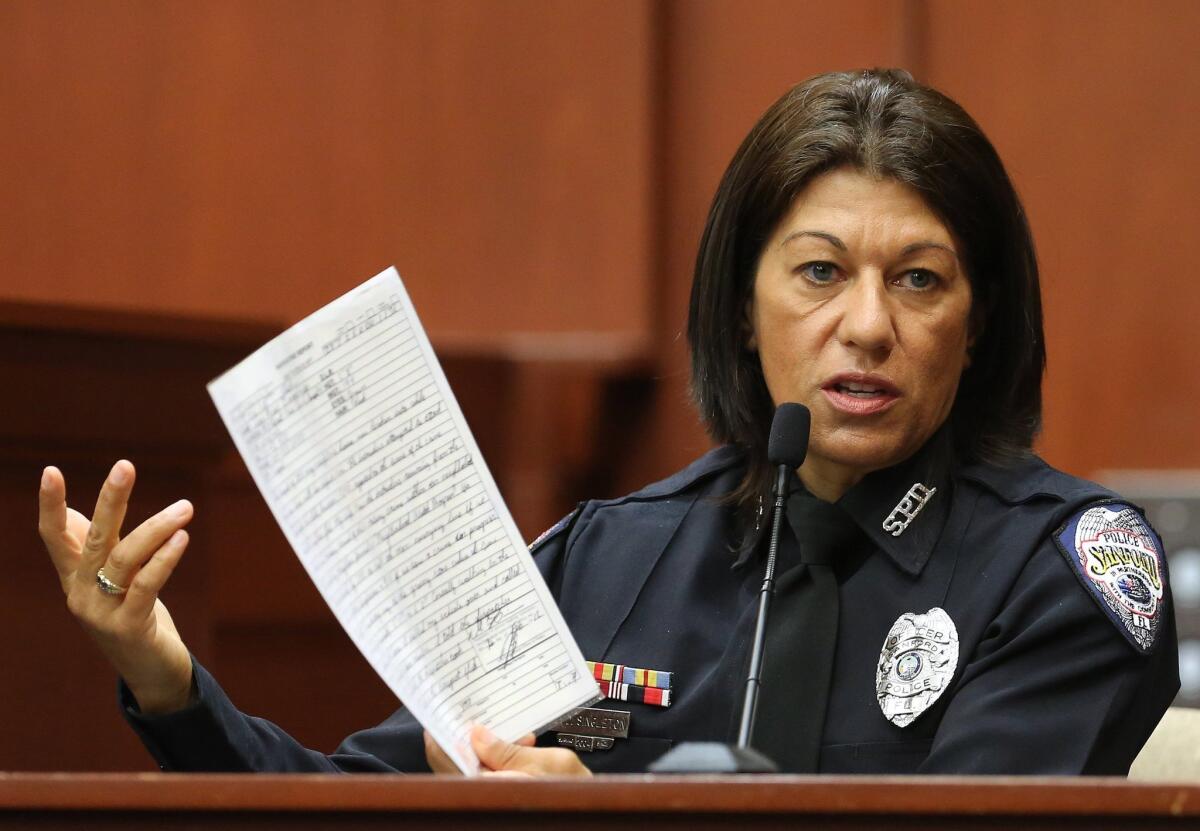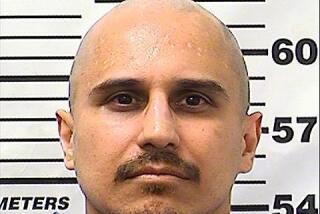Jury hears Zimmerman’s voice describe shooting of Trayvon Martin

- Share via
Jurors heard the voice of George Zimmerman describe his fateful confrontation with unarmed teenager Trayvon Martin as police investigators who interviewed the neighborhood watch volunteer took the stand on Monday.
Zimmerman, 29, is charged with second-degree murder in the shooting of Martin, a 17-year-old African American, on Feb. 26, 2012, in a gated community in Sanford, Fla. Zimmerman has said he shot Martin in self-defense.
Defense attorneys have not said whether Zimmerman will take the stand on his own behalf when the defense presents its case. So Zimmerman’s comments and written statements to police may be the only version that the six-person jury gets to hear in the trial, which prompted demonstrations by civil rights leaders across the nation.
PHOTOS: The controversial case in pictures
Doris Singleton, of the Sanford Police Department, took the stand Monday morning after an FBI expert questioned whether there was any scientific basis to identify the voice screaming in the background of a 911 emergency telephone call. The defense contends the voice belongs to Martin while the prosecution argues it is Zimmerman’s.
She was followed by Chris F. Serino, the lead investigator who interviewed as well as videotaped Zimmerman as they walked through the 2012 events.
Singleton was the first police officer to interview Zimmerman after the shooting. In the recording, Zimmerman is heard describing how he saw Martin and told a police dispatcher: “These guys always get away. ... The people committing the burglaries.” That is one of the prosecution’s themes about motive as they have portrayed Zimmerman as becoming increasingly frustrated by crime in the housing community.
GRAPHIC: Who’s who in the Trayvon Martin case
Zimmerman told Singleton that he lost track of Martin so he got out of his truck to look for a street name that he could pass on to authorities. When the dispatcher said that Zimmerman didn’t need to follow Martin and that he should leave the investigation to police, Zimmerman said he started to head back to his vehicle.
At that point, Zimmerman said Martin jumped out from some bushes and attacked him and that Zimmerman fell to the ground. Zimmerman said he yelled for help as Martin began hitting Zimmerman’s head against the sidewalk.
“I said ‘Help me. Help me. He’s killing me,’” Zimmerman said. He then told the police investigator that Martin replied: “You’re going to die tonight.”
Zimmerman said he struggled with Martin. As they fought, Zimmerman said his clothes were pushed up enough to show his gun. Zimmerman said he thought Martin was reaching for the weapon so the neighborhood watch volunteer said he shot Martin.
“You got me,” the teenager said, Zimmerman told the officer.
Jurors were also given Zimmerman’s written statement, which Singleton read. Prosecutor Bernie de la Rionda noted that Zimmerman repeatedly refers to Martin as a “suspect.” Singleton said she never told him to use that term.
Prosecutors maintain that Zimmerman profiled Martin, followed him and attacked him and that there was no evidence that Martin was a suspect. Martin actually was returning from a convenience store where he had just purchased candy and a soft drink and was returning to a house at the complex where he was staying.
In the statement, Zimmerman again described the beating he said he received. “My head felt like it was going to explode... the suspect covered my mouth and nose and stopped my breathing.”
Zimmerman also wrote that after the shot, he climbed on top of Martin and spread his arms. Police who responded to the incident testified last week that Martin’s hands were beneath the teenager’s body when they arrived at the scene.
On cross-examination, defense attorney Mark O’Mara tried to minimize the impact of possible contradictions by asking Singleton whether a traumatic event, like a shooting, could have an effect on a person’s ability to recount the events. She agreed it could.
Singleton also said she had no evidence that Zimmerman had any ill will, anger or hatred for the teen. Those terms go to what the prosecution must prove to get a second-degree murder conviction.
Singleton said Zimmerman seemed surprised when she told him Martin was dead. “He’s dead?” Singleton recounted Zimmerman asking.
ALSO:
Las Vegas audience saw Cirque du Soleil performer’s fatal plunge
Battle of Gettysburg’s 150th anniversary has the town in high gear
Mustangs: How to manage America’s wild horses? The debate rages
More to Read
Sign up for Essential California
The most important California stories and recommendations in your inbox every morning.
You may occasionally receive promotional content from the Los Angeles Times.










